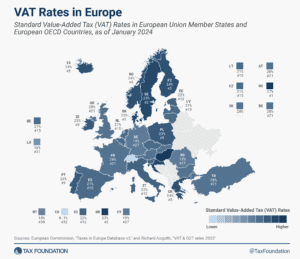
Featured Articles

All Related Articles

Spain’s Recovery Budget Comes with Tax Hikes
While other countries in Europe are working towards introducing tax cuts and stimulating economic recovery by supporting business investment and employment, Spain is putting more fiscal pressure on households and businesses.
4 min read
A Framework for the Future: Reforming the UK Tax System
Our new guide identifies key areas for improvement in UK tax policy and provides recommendations that would support long-term growth without putting a dent in government revenues.
24 min read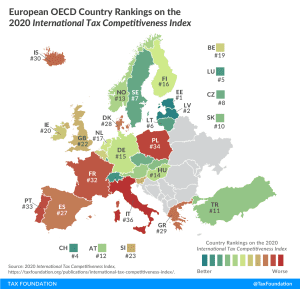
International Tax Competitiveness Index 2020
Our International Index compares OECD countries on over 40 variables that measure how well each country’s tax system promotes sustainable economic growth and investment.
13 min read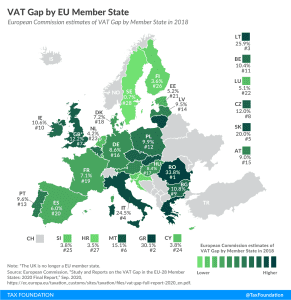
New European Commission Report: VAT Gap
Just as COVID-19 is putting pressure on other sources of revenue, the loss of VAT revenues resulting from the crisis will force governments to evaluate their VAT systems.
3 min read
Contrary to Popular Belief, Value-Added Taxes Found to Be Slightly Progressive
Value-added taxes (VAT) are traditionally considered regressive, meaning they place a disproportionate burden on low-income taxpayers. However, a recent OECD study used household expenditures micro-data from 27 OECD countries to reassess this conclusion.
5 min read
Where Should the Money Come From?
The fiscal response to the COVID-19 pandemic will require policymakers to consider what revenue resources should be used to fill budget gaps. Tax policy experts have proposed wealth taxes, (global) corporate minimum taxes, excess profits taxes, and digital taxes as opportunities for governments to raise new revenues.
20 min read
Brazil has the Opportunity to Implement a Simple Consumption Tax and Foster Tax Progressivity at the Same Time
Brazil has one of the world’s most complex tax systems. Brazil has the opportunity to implement a simple consumption tax and foster tax progressivity at the same time.
5 min read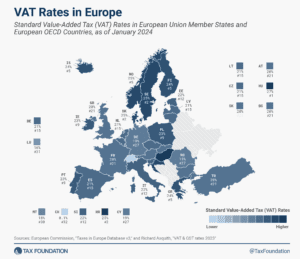

Revenue Gains in Asian and Pacific Countries Likely Offset by COVID-19
Because of the COVID-19 pandemic and the associated economic crisis, countries in the Asia-Pacific region will see a differentiated impact on their capacity of mobilizing domestic revenue depending on the structure of their economy. According to the OECD report, those economies that rely mostly on natural resources, tourism, and trade taxes are especially vulnerable.
5 min read
Global Tax Relief Efforts Vary in Scope and Time Frame in Response to COVID-19
Countries around the world have implemented and continue to implement emergency tax measures to support their economies during the coronavirus (COVID-19) crisis.
5 min read
Germany Adopts a Temporary VAT Cut
Tax policy responses to the pandemic should be designed to provide immediate support while paving the way to recovery. A temporary VAT rate cut in the context of an inefficient VAT system is likely to deliver mixed results at best.
4 min read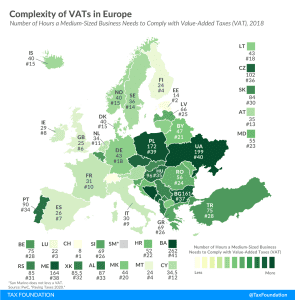
Complexity of VATs in Europe
2 min read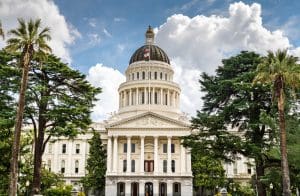
California Considers Business Head Tax Plan that Seattle Repealed
With California’s unemployment rate approaching 25 percent, it is somewhat surprising to find policymakers contemplating a literal tax on jobs.
3 min read
Lessons from Alberto Alesina for U.S. Lawmakers
Alesina’s work suggests that raising taxes to reduce the federal deficit and national debt would be an economic mistake. The less economically damaging path is to cut spending, what some have called austerity policies.
3 min read
A Comparison of the Tax Burden on Labor in the OECD, 2020
A higher tax burden on labor often leads to lower employment rates and wages. That’s important for policymakers to remember as they look for ways to help their economies recover from coronavirus-induced shutdowns. If their goal is to encourage employment, policies that lower the tax burden on labor could prove a powerful tool.
20 min read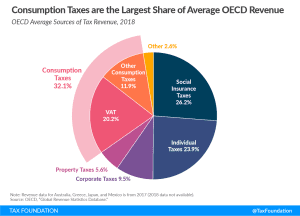
New OECD Study: Consumption Tax Revenues during Economic Downturns
Compared to other tax revenue sources, consumption tax revenue as a share of GDP tends to be relatively stable over time, even during economic downturns.
2 min read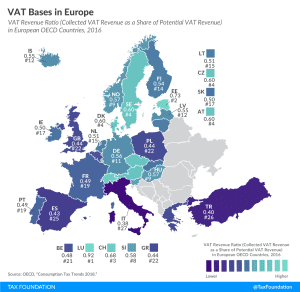
VAT Bases in Europe
The extent to which businesses and consumers will benefit from coronavirus relief measures like temporary VAT changes will depend on the VAT base.
2 min read
Denmark Unplugs the Economy
Denmark, a high-tax country with 5.5 million citizens, has implemented policies designed to avoid layoffs and bankruptcies and basically unplug the economy during the pandemic.
4 min read
Norway Opens the Fiscal Toolbox
Norway passed a large coronavirus tax relief package to address layoffs and bankruptcies, which includes a reduced VAT rate, the introduction of a loss carryback provision, and targeted postponements for wealth tax payments, among other provisions.
5 min read
Tax Policy and Economic Downturns
The Great Recession provides some insight into how tax revenues declined during a deep recession. Across OECD countries, revenues fell by 11 percent from 2008 to 2009 with corporate income taxes seeing the steepest decline at 28 percent. Revenues from individual income taxes fell by 16 percent.
4 min read